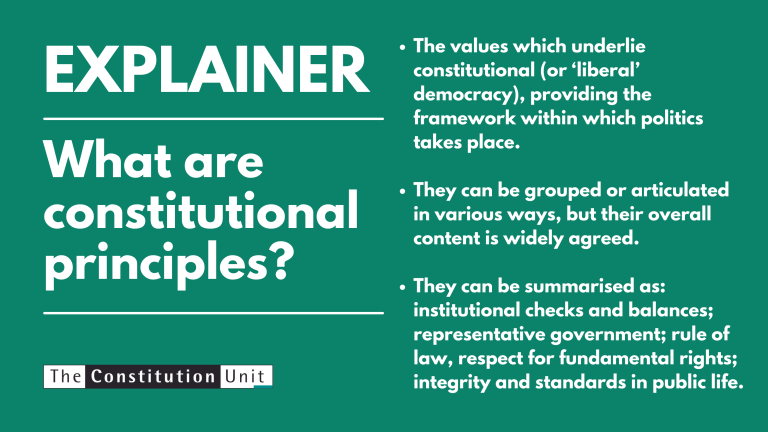
Constitutional principles are the values which underlie constitutional (or ‘liberal’) democracy. These principles provide a framework within which politics is properly conducted.
There exists no single definitive list of constitutional principles, but their fundamental content is widely agreed. These can be grouped as follows: institutional checks and balances; representative government; the rule of law; protection of fundamental rights; and integrity and standards in public life.
The first principle is institutional checks and balances. Power should be distributed between different institutions (including the executive, legislature and judiciary), so that no one body can act with unchecked power – a concern most often expressed in respect of the executive. The legislature is one of the most important checks on the executive, particularly through the UK’s constitutional doctrine of parliamentary sovereignty. In parliamentary systems such as the UK the government derives its authority from the legislature and is accountable to it politically, meaning MPs have the right to scrutinise or reject government proposals, and even to remove the government. The courts provide another check, ensuring that the executive does not exceed its legal authority.
The second constitutional principle is representative government. The scale and complexity of the governing apparatus make direct citizen involvement in all decision-making impossible. Instead, elected politicians act on behalf of the public. Crucially, representatives must be selected through free and fair elections underpinned by universal suffrage, equal rights to stand for office, and independent electoral oversight.
Another constitutional principle is the rule of law, which prevents arbitrary rule by the state. Although precise definitions vary, in its simplest form the rule of law constitutes universally applicable laws made via due process and meeting certain standards of fairness, legal certainty, equal treatment before the law, and judicial independence. Upholding the rule of law ensures that the state and its agents are also subject to the law and cannot act outside it.
Closely related to the rule of law is respect for fundamental rights (e.g. freedom of speech, assembly and expression, and various individual liberties). The principle of universal respect for fundamental rights guards against the risk of majority rule lapsing into majority tyranny.
Finally, a vibrant democracy should observe integrity and standards in public life. Confidence in the democratic system is undermined if the public perceive politicians as dishonest or untrustworthy. It is also crucial that those working in different parts of the system maintain a mutual respect between different democratic institutions. This includes adhering to long-standing conventions, supporting the operation of independent regulators, and avoiding rhetoric which reduces public confidence in institutions – and can ultimately harm constitutional democracy itself.
The five constitutional principles set out here are indispensable to a constitutional democracy, in which citizens agree to be governed, and the state agrees to constraints on its power. Crucially, politicians should view themselves as the stewards of the political system, respecting the spirit, as well as the letter of these principles. People working in all parts of the system, including politicians, judges, and civil servants, have a duty to uphold such principles.
 Close
Close



